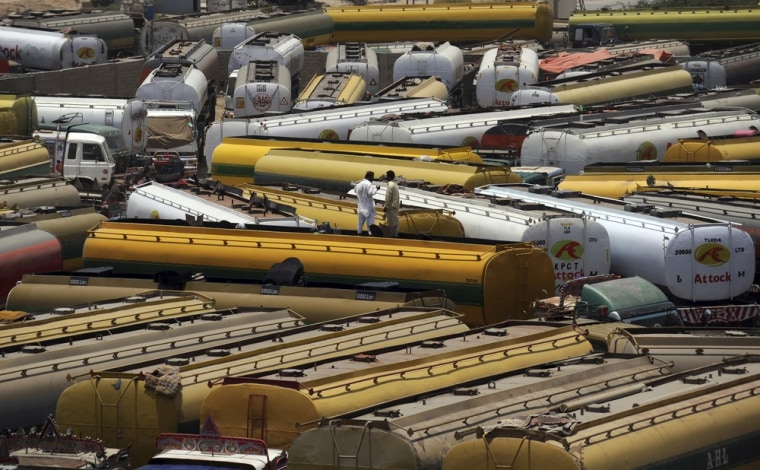Pakistani truck drivers who deliver supplies to Western forces in Afghanistan seethe whenever they recall a cross-border NATO air attack that killed 24 Pakistani soldiers last year.
Despite their anger, financial survival outweighs nationalist sentiment and the shame of helping what many see as the enemy.
The drivers hope that talks between the United States and Pakistan on reopening the routes, which were closed six months ago in protest over the raid, will soon produce a breakthrough.
They are eager to get back on the road, even though they will again risk running into attacks by Taliban militants who violently oppose the movement of goods to NATO through Pakistan.
AK-47 assault rifles
Malik Abdul Raoof, 23, recalled how militants in dark clothes clutching AK-47 assault rifles often stopped and threatened him near the Afghanistan-Pakistan border.
"They asked 'why do you take supplies to the infidel Americans?'. They said 'you are an American informer'," he told Reuters at a massive makeshift truckers' parking lot that stretches for miles along the coast in Pakistan's biggest city, Karachi.
"They made me recite Quranic verses, quizzed me on how Muslims pray. When they let me go they told me to grow a beard. I am scared and I don't like it but I have to earn (money)."
The al Qaida-linked Taliban routinely open fire on trucks. Casualties are limited, but the attacks are dramatic. Bullets puncture fuel tanks, igniting huge fires.
Militants also set off homemade bombs to destroy container trucks packed with food, clothes and other items for NATO.
More than 1,000 vehicles have been destroyed by militants or criminal gangs in the last decade, according to the All Pakistan Oil Tankers Association.
Still, thousands of drivers are itching to get back to work to fetch 20,000-25,000 rupees ($215-269) per round trip.
To break the monotony, they play cards on cloth sheets spread on the dusty ground, listen to music and repair and paint their run-down vehicles. Some just sleep the time away in the shade of their trucks.
The November NATO attack and Pakistan's closure of the routes — which account for just under one-third of all cargo that NATO moves into Afghanistan — plunged ties between Islamabad and Washington to their lowest point in years.
The supply lines are considered vital to the planned withdrawal of most foreign troops from Afghanistan before the end of 2014.

U.S. and Pakistani negotiators are deadlocked on transit fees for container and fuel trucks. Pakistani officials have denied reports Islamabad is demanding unreasonable amounts.
'I'm desperate'
Idle drivers care little about Pakistan's stance, or efforts to repair ties with the United States, the source of billions of dollars in aid. It all comes down to their own bottom line.
"The United States is responsible for killing our soldiers. The culprits should be shot dead," said Mohammed Nawaz, 24, looking across a sea of trucks. "I consider the money made from driving NATO trucks despicable, forbidden. But I'm desperate."
NATO, for its part, has been diversifying its supply lines into Afghanistan.
After a string of disruptions, the alliance and the U.S. military decided to reduce their reliance on Pakistan, turning instead to routes that pass through either Russia or the Caucasus across central Asia into northern Afghanistan.
That could spell bad news for those drivers who have become shady entrepreneurs of danger along the two routes through Pakistan — one across the Khyber Pass to Kabul, and another crossing the Baluchistan province to Kandahar.
Senior officials at the All Pakistan Oil Tankers Association said some destroy their own trucks and claim it was a Taliban attack to collect insurance money.
"The fight is all about money, at every level. The governments, the Americans, the workers (truck drivers)," said Shafiq Kakar, a senior member of the association.
Some truckers stage explosions and pretend NATO goods are lost in attacks, then sell part of the consignment to traders, said association officials.
"I am praying that NATO supplies are resumed soon so that my business can take off again," said one trader in the northwestern city of Peshawar who does business with corrupt truckers and contractors.
"A lot of the material stolen from containers, especially uniforms and boots, is (even) bought by the Taliban's people."